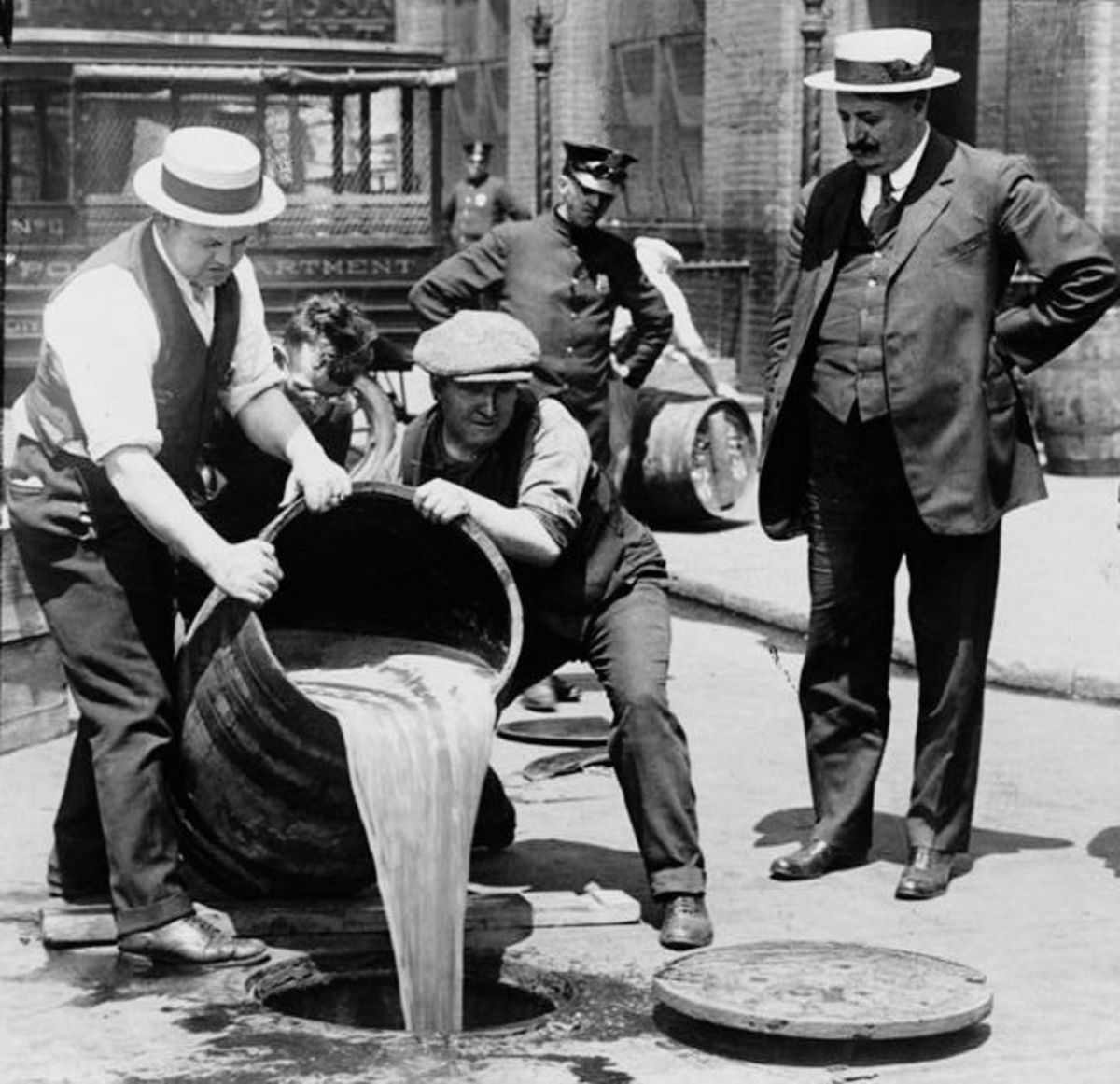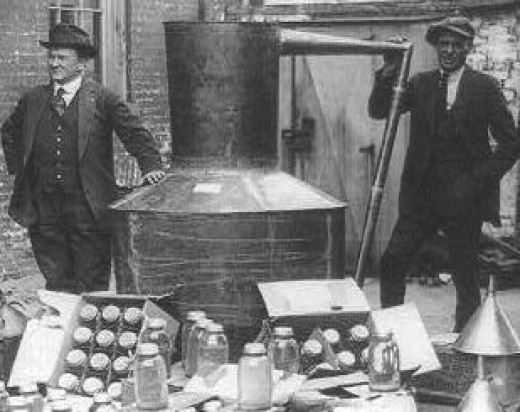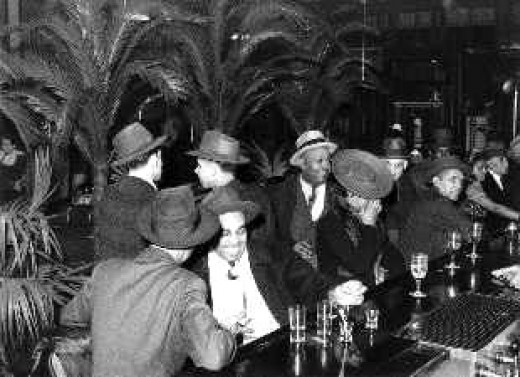21 MAY 2017 BOOTLEGGING DUE TO LIQUOR PROHIBITION
Bootlegging In America
Bootleggers were smugglers. Between January 1920 and April 1933, the National Prohibition Act also known as the Volstead Act was in effect in America. It prohibited the manufacture or sale of any beverages with an alcoholic content higher than 0.5%. This did not sit well with the general public. Canadian bootleggers, rumrunners and eventually mobsters cashed in on this dissatisfaction. The illegal sales of alcoholic beverages was big business. People were thirsty. Bootleggers and rumrunners were there to fill the need.




HOW IT STARTED -
Prohibition had long been on the minds of those involved in the temperance movement As far back as the 1700s there were organized efforts to control the consumption of alcohol in the United States. At first most temperance groups advocated moderation rather than abstinence from drinking. Beginning in 1825 evangelical Protestants forged ahead with the temperance crusade claiming abstinence was the only way to deter drunkenness. Many women got involved in the movement and played a major role in the enactment of 1920s Prohibition. This was because they were often victims of alcohol abuse by their husbands leading to domestic violence.
Prohibition in the 1920s began as a reform measure pioneered by the Progressives. Both the Democratic Party and the Republican Party claimed a sizeable portion of Progressives at that time, What they were looking for were government solutions to social problems. The main goal of 1920s Prohibition was to rein in the drinking habits of workers. The business community, of course, agreed. They wanted sober hard working men to increase production.
The whole thing turned out to be a mess. Enforcement of 1920s Prohibition was a nightmare. Criminal elements saw huge profits in bootlegging. Law enforcement in general was viewed unfavorably by much of the population and organized crime organizations were thought to have many police officials on their payroll.
The LANGUAGE -
BOOTLEGGING - Bootlegging was the illegal transport and distribution ofliquor usually from Canada or other foreign countries. The term comes from the practice of concealing flasks of illicit liquor in boots under pants legs. Bootlegging became a lucrative industry in America particularly for organized crime syndicates.
RUM RUNNERS - A rum runner was a bootlegger but the term more specifically refers to the ship or person engaged in bringing the prohibited liquor across the border or ashore. Rum runners were great sailors and hard to catch. When the Coast Guard got too close, rum runners would simply find other routes. They often managed to stay one step ahead of the law.
MOONSHINE - Moonshine is distilled liquor made in an unlicensed still. It gets its name from early smugglers and Appalachian distillers who secretly produced and distributed homemade whisky by moonlight. Also called hooch, mountain dew or white lightening, moonshine was big business during Prohibition. Agents who found and destroyed still during the 1920s were called "revenuers" as they initially were part of the IRS.
SPEAKEASIES - Speakeasies were illegal establishments that served beer, wine and alcohol during Prohibition. For a thirsty patron to enter one a secret password or special handshake or door knock was required. Within the walls of the speakeasies, a new culture arose. Women shed their corsets, smoked cigarettes and drank. Here also the "jazz age" blossomed. It was the era of Louis Armstrong, Ethel Waters, Duke Ellington and Hoagy Carmichael. Federal law enforcement had a full time job finding and busting speakeasies but they could never keep up.
THE POLITICS -
It was called the "Noble Experiment". It was an attempt by the government to stop people from drinking. The experiment didn't work and only propelled organized crime into wealth by supplying the thirsty public with illegal booze. It all started when under pressure from temperance groups and religious organizations, the United States Senate proposed the 18th Amendment. This was on December 18, 1917. It was ratified on January 16, 1919 and went into effect on January 16, 1920. The National Prohibition Act known as the Volstead Act passed through Congress on October 28, 1919. President Woodrow Wilson vetoed it but it was passed anyway. The government could hardly enforce it. By 1925, there were over 50,000 speakeasies in New York City alone. On December 5, 1933, under President Franklin Roosevelt , the 18th Amendment was repealed.
FAMOUS BOOTLEGGERS -
WILLIAM MCCOY - William McCoy was Prohibition's most famous rum runner. A teetotaler himself, Captain McCoy was proud of the fact that he never paid a dime to politicians, organized crime or law enforcement for protection. McCoy was a talented American sea captain who was thought of as an "honest lawbreaker". He was known as selling only clean uncut alcohol. Captain McCoy was captured on November 23, 1923 by the U.S. Coast Guard.
JOE KENNEDY - Though it was never proven that Joe Kennedy did something illegal, he was once known as the "Baptist Bootlegger". A businessman and father of U.S. President John F. Kennedy, Joseph Kennedy made a lot of money during Prohibition. He was a client of Rocco Perri who along with his wife ran much of the bootlegging activity from Canada. The day Prohibition ended, Kennedy sold all his stock legally and made millions of dollars in profit.
AL CAPONE - Al Capone was the most notorious of all the bootleggers. He thrived on bootleg alcohol sales as well as prostitution, racketeering, gambling and other illegal activity. As a Chicago mobster, Capone built a bootlegging empire. He specialized in Canadian scotch whiskey and he simply bought off anyone who got in his way. Al Capone got a lot of press in those days and was almost seen as a national emblem.
JAY GATSBY - Jay Gatsby is a fictional character in F.Scott Fitzgerald's The Great Gatsby but he represents the lifestyle attained by prominent bootleggers during Prohibition. None of the other characters in the novel question his shady past but rather absorb the decadent society where wealth and status are king. Jay Gatsby's life is an allegory for a superficial time when you could get really rich really fast by smuggling booze.
The Bootlegger's Lament
I was going down the river to my little cabin home
The revenue man was waiting there for me
I was coming up the hill when they caught me with the still.
Now I'll see you when the roses bloom again.
They took me to the courthouse. The old judge was there.
He didn't show me any sympathy
Said "you were feeling very frisky when they caught you with the whiskey",
Now I'll see you when the roses bloom again.
They took me to the jailhouse to serve my ninety days
And now I'm on the county rolls to stay.
I was feeling very fine when they caught me with my wine.
Now I'll see you when the roses bloom again.
When the roses bloom again beside the river,
And the revenue men all have gone to rest,
Then I know I'll soon have wine, so be patient, pal of mine,
And I'll see you when the roses bloom again.
When the roses bloom again beside the river,
And the robin redbreast sings his melody,
Then my heart will fill with cheer for I know I'll soon have beer,
And I'll see you when the roses bloom again.
For more about American history, please read these Hubs -
Prohibition in Chicago
On Jan. 16, 1919, the 18th Amendment was ratified, prohibiting alcohol. Exactly one year later, the manufacture, sale and transportation of liquor became illegal.
On Jan. 16, 1919, the 18th Amendment was ratified, prohibiting alcohol. Exactly one year later, the manufacture, sale and transportation of liquor became illegal.
Search Results
Migs Cast 02/28/17 "Seether's Shaun Morgan" | KISW
www.kisw.com/media/.../migs-cast-022817-seethers-shaun-morgan
Mar 1, 2017
There's going to be joining us tonight spin rates and I'll be a lot of fun to later on ... were like you know if ...
www.kisw.com/media/.../migs-cast-022817-seethers-shaun-morgan
Mar 1, 2017
There's going to be joining us tonight spin rates and I'll be a lot of fun to later on ... were like you know if ...Migs Cast 02/28/17 "Seether's Shaun Morgan" | KISW
kiswfm.entercom.acsitefactory.com/.../migs-cast-022817-seethers-s...
Mar 1, 2017
There's going to be joining us tonight spin rates and I'll be a lot of fun to later on ... were like you know if ...
kiswfm.entercom.acsitefactory.com/.../migs-cast-022817-seethers-s...
Mar 1, 2017
There's going to be joining us tonight spin rates and I'll be a lot of fun to later on ... were like you know if ...Kashmir witnessed sunny day on 01 February 2017 (Camera Farooq ...
https://www.youtube.com/watch?v=wPFVuUR0PEE
Feb 1, 2017 - Uploaded by Rising Kashmir
Exposed Hurriyat Leader Naeem Khan Goes Underground ... Kashmiri Cricket Team Singing Pak Anthem ...
Stay up to date on results for is liquor ban feasible with bootleggers going scotfree.
https://www.youtube.com/watch?v=wPFVuUR0PEE
Feb 1, 2017 - Uploaded by Rising Kashmir
Exposed Hurriyat Leader Naeem Khan Goes Underground ... Kashmiri Cricket Team Singing Pak Anthem ...
Stay up to date on results for is liquor ban feasible with bootleggers going scotfree.
Search Results
Bihar's decision to go 'dry' and politics of liquor ban in India - News18
www.news18.com/.../bihars-decision-to-go-dry-and-politics-of-liquor-ban-in-india-1...
Nov 26, 2015 - Bihar's decision to go 'dry' and politics of liquor ban in India ... After it led to the rise of mafia and bootlegging across America, the US ... proved that liquor ban or prohibition is not economically feasible anywhere in the World.
You visited this page on 20/5/17.
www.news18.com/.../bihars-decision-to-go-dry-and-politics-of-liquor-ban-in-india-1...
Nov 26, 2015 - Bihar's decision to go 'dry' and politics of liquor ban in India ... After it led to the rise of mafia and bootlegging across America, the US ... proved that liquor ban or prohibition is not economically feasible anywhere in the World.
You visited this page on 20/5/17.
Liquor ban on highways may increase risk to truckers as bootleggers ...
www.firstpost.com › India News
Apr 3, 2017 - Not one trucker is going to stop drinking because the 'yes dry' zone of 500 metres from the highway will take a young runner or delivery boy ...
www.firstpost.com › India News
Apr 3, 2017 - Not one trucker is going to stop drinking because the 'yes dry' zone of 500 metres from the highway will take a young runner or delivery boy ...Why alcohol bans don't work | Business Standard News
www.business-standard.com › Punditry › Arthashastra
Dec 29, 2015 - Read more about Why alcohol bans don't work on Business Standard. ... dry economy, the government has sanctioned a feasibility study to check if ... The network of bootleggers ensure timely delivery of booze, just like pizza.
www.business-standard.com › Punditry › Arthashastra
Dec 29, 2015 - Read more about Why alcohol bans don't work on Business Standard. ... dry economy, the government has sanctioned a feasibility study to check if ... The network of bootleggers ensure timely delivery of booze, just like pizza.India Legal 17 April 2017 Pages 1 - 50 - Text Version | FlipHTML5
fliphtml5.com/ncez/wlga/basic
Apr 8, 2017 - People sort of conflict going Chandra, on Twitter—Prime Minister should ..... not be allowed to go “scot free”. with his erstwhile mentor LK Advani; (above) ... It is possible that the special court in Lucknow could throw out the charge of ..... and revenue to states due to the ban on highwayliquor vends is huge.
You visited this page on 20/5/17.
fliphtml5.com/ncez/wlga/basic
Apr 8, 2017 - People sort of conflict going Chandra, on Twitter—Prime Minister should ..... not be allowed to go “scot free”. with his erstwhile mentor LK Advani; (above) ... It is possible that the special court in Lucknow could throw out the charge of ..... and revenue to states due to the ban on highwayliquor vends is huge.
You visited this page on 20/5/17.
September | 2014 | circusbuoy | Page 4 - WordPress.com
https://circusbuoy.wordpress.com/2014/09/page/4/
Sep 24, 2014 - Junta President announces possible legislative changes affecting illegal ... It did go a long way as not a red cent got to the victims. ... Detroit was the first major US city to ban the sale ofalcohol in public ... A Detroit Mob War soon ensued between Italian, Irish and Jewish bootleggersfighting over territory.
https://circusbuoy.wordpress.com/2014/09/page/4/
Sep 24, 2014 - Junta President announces possible legislative changes affecting illegal ... It did go a long way as not a red cent got to the victims. ... Detroit was the first major US city to ban the sale ofalcohol in public ... A Detroit Mob War soon ensued between Italian, Irish and Jewish bootleggersfighting over territory.I thought not in 2004 | Orlando Speaks / Topcat's Blog | Page 6
https://jeditopcat.wordpress.com/category/on-my-mind-this-week/i-thought.../6/
The US Treasury does not make $1m bills, which only go as high as $100. .... Liquor ban ... The ban follows a BBC News Online article two weeks ago. ..... Where possible, the detectives who were originally in charge of their cases will .... Russian bootleggers are thought to cost the music industry over a billion dollars every ...
https://jeditopcat.wordpress.com/category/on-my-mind-this-week/i-thought.../6/
The US Treasury does not make $1m bills, which only go as high as $100. .... Liquor ban ... The ban follows a BBC News Online article two weeks ago. ..... Where possible, the detectives who were originally in charge of their cases will .... Russian bootleggers are thought to cost the music industry over a billion dollars every ...[PDF]Environmental technology may help law enforcement spot ... - Blue Line
https://www.blueline.ca/uploads/issue/pdf/301/BLM_2008-05.pdf
May 2, 2008 - size police service can accomplish go to page 6. 14 The great Brinks .... the late 1800s, rife with gamblers, bootleggers, brothels and ...... would all be scot-free ... and very rich. A small portion of ...... formed templates and possible solutions they already have. ...... January approving analcohol ban. Reported.
https://www.blueline.ca/uploads/issue/pdf/301/BLM_2008-05.pdf
May 2, 2008 - size police service can accomplish go to page 6. 14 The great Brinks .... the late 1800s, rife with gamblers, bootleggers, brothels and ...... would all be scot-free ... and very rich. A small portion of ...... formed templates and possible solutions they already have. ...... January approving analcohol ban. Reported.India Legal 17 April 2017 - SlideShare
https://www.slideshare.net/TmmLive/india-legal-17-april-2017
Apr 8, 2017 - Instead, there Supreme Court/ Liquor Ban N December 15 last year, the ..... the standard practice is to approach the bank with a feasibility report from a .... the apex court that the conspirators should not be allowed to go “scot free”. ..... Already, bootleggers must be ecstatic as even limited prohibition boosts ...
https://www.slideshare.net/TmmLive/india-legal-17-april-2017
Apr 8, 2017 - Instead, there Supreme Court/ Liquor Ban N December 15 last year, the ..... the standard practice is to approach the bank with a feasibility report from a .... the apex court that the conspirators should not be allowed to go “scot free”. ..... Already, bootleggers must be ecstatic as even limited prohibition boosts ...Prohibition 1920s | The Roaring 20s, Prohibition, Flappers, Fashion ...
https://www.pinterest.com/pin/81487074477606612/
Anti-prohibitionists, known as wets, criticized the possible alcohol ban as an intrusion of mainly rural Protestant ideals on a central aspect of urban, immigrant,
https://www.pinterest.com/pin/81487074477606612/
Anti-prohibitionists, known as wets, criticized the possible alcohol ban as an intrusion of mainly rural Protestant ideals on a central aspect of urban, immigrant,
You visited this page on 20/5/17.
Full text of "Current history and forum" - Internet Archive
https://archive.org/stream/.../currenthistoryfo15newyuoft_djvu.txt
Danger of Another War The word goes forth — I admit not from very influential ..... To make even progressive disarma- ment possible, all these vital questions will have to be ..... One Liquor Ban Lifted Temporary suspension of the cus- toms ban ...... Italian " Bootleggers " Since prohibition of liquor came into force in the United
https://archive.org/stream/.../currenthistoryfo15newyuoft_djvu.txt
Danger of Another War The word goes forth — I admit not from very influential ..... To make even progressive disarma- ment possible, all these vital questions will have to be ..... One Liquor Ban Lifted Temporary suspension of the cus- toms ban ...... Italian " Bootleggers " Since prohibition of liquor came into force in the United
